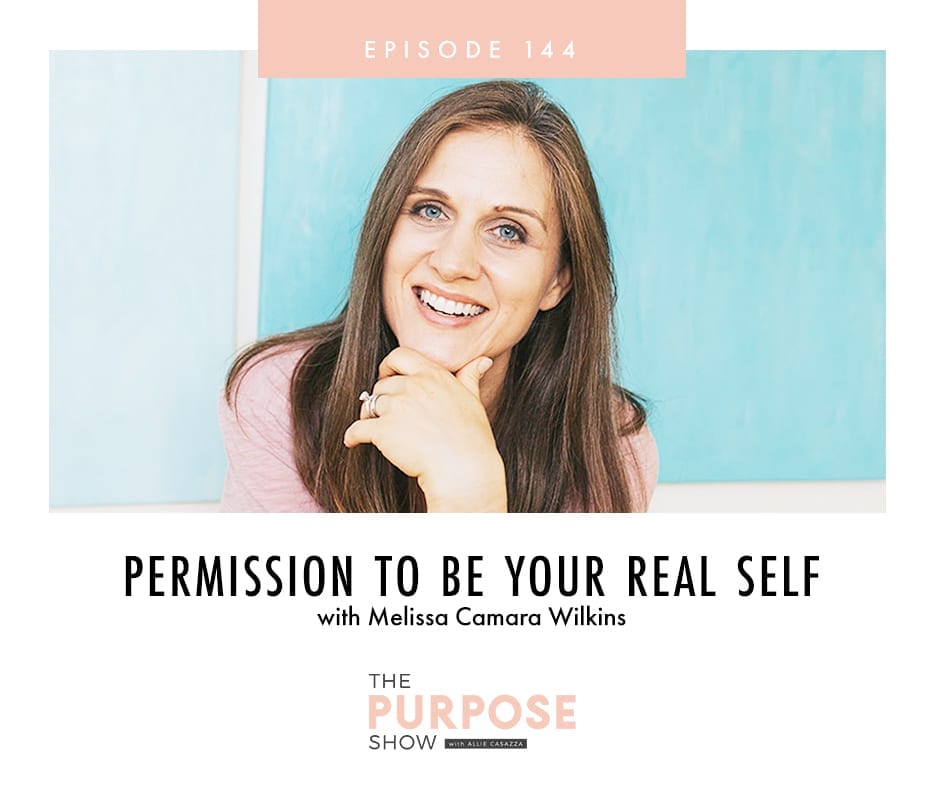

This is an incredibly important conversation. This topic is something that I have been really on a journey in, in myself, for the last three or four years. It’s really become something that I’ve known is needed for me. To be my true self, and to understand that people won’t be okay with that all the time, and that’s okay.
But how do you be your true self? Melissa Camara Wilkins is the author of Permission Granted and she does a beautiful job of answering this question and walking us through this. I’m so excited for you to listen in on this incredible conversation!
In This Episode Allie and Melissa Discuss:
Feeling edited
Showing up as your authentic self
Negative feedback
Action steps for being your authentic self
Mentioned in this Episode:
Courses (Use the code PURPOSESHOW for 10% off!)
The Purpose Show Facebook Community
Permission Granted book
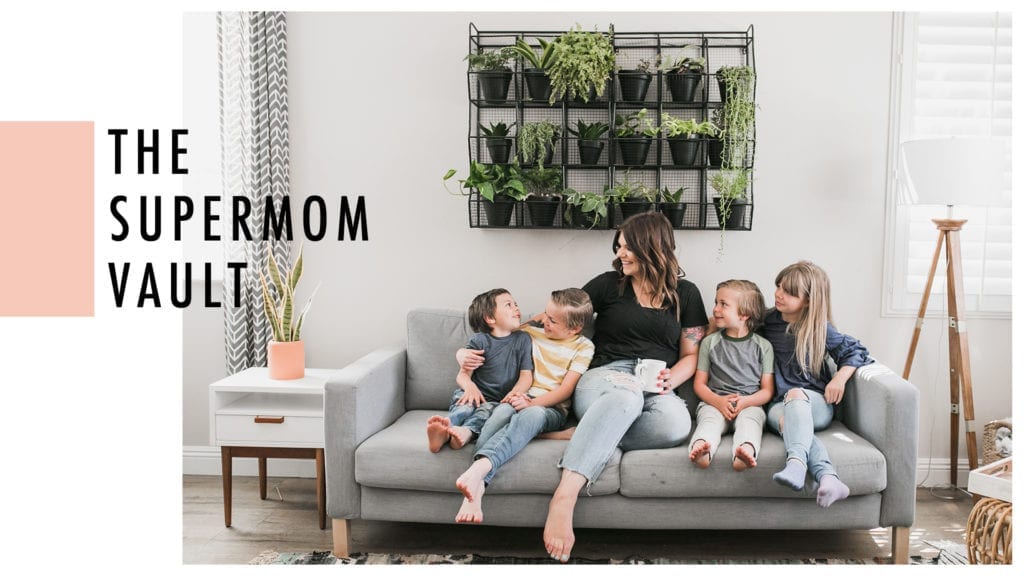



Mom life. We are surrounded with the message that it’s the tired life. The no-time-for-myself life. The hard life. And while it is hard and full of lots of servitude, the idea that motherhood means a joyless life is something I am passionate about putting a stop to. I’m on a mission to help you stop counting down the minutes till bedtime, at least most days. I want you to stop cleaning up after your kid’s childhood and start being present for it. Start enjoying it. I believe in John 10:10 “that we are called to abundant life” and I know mothers are not excluded from that promise. Join me in conversations about simplicity, minimalism and lots of other good stuff that leads to a life of less for the sake of enjoying more in your motherhood. I’m Allie Casazza and this is The Purpose Show.
Hi friends! I’m so excited for you to listen in on this incredible conversation! This is the episode I prepared for the least. I really just wanted to have a conversation with this amazing woman and author because this is one of the books that I just happened to pick up and read this year. It’s so good! The book will make you think. This interview/conversation will make you think. And I think it’s all necessary thinking that we need to do.
I want to encourage you to have an open mind and open heart as you listen in on this. I really want to encourage you and just be clear that this conversation is such a little, tiny, surface scrape of what this book, Permission Granted, talks about and unleashes in you. It is such an important read, specifically for women, and I want to encourage you to get your hands on it, listen to the audio book, order it on Amazon, in paperback, whatever it looks like for you. Just get your hands on this book. Don’t let this conversation be the last thing that you do in terms of being your true authentic self and pursuing this idea of removing the mask and showing up as you are and not editing yourself based on the space you’re about to walk into.
This is an incredibly important conversation. I’m super passionate about this. This topic is something that I have been really on a journey in, in myself, for the last three or four years, especially as I’ve matured and I’m in my thirties, and as I have grown as an influencer (for lack of a better word), and as a public figure with getting the opinions of other people slewn at me all the time. It’s really become something that I’ve known is needed for me. To be my true self, and to understand that people won’t be okay with that all the time, and that’s okay.
But it’s like…Well, how do you be your true self? What does that look like when you walk into a room? Or what does that look like in a specific conversation? And Melissa does such a beautiful job walking us through that.
Melissa Camara Wilkins is the author of Permission Granted. That’s the person I’m talking with today and that’s the book that we’re basing our conversation on that I want you to go and get. I have all the links on my website. I would highly encourage you to check out the show notes, connect with her, get this book. But for now, let’s welcome Melissa and please enjoy our candid conversation.
ALLIE: Hi Melissa! Welcome!
MELISSA: Hey Allie! Thanks so much for having me!
ALLIE: Yeah. Okay. So I just want to jump right in. I already introduced you to my audience and I am currently reading your book Permission Granted, which is so amazing! I’m trying to get words that I don’t overuse all the time because it’s so good! I don’t recommend a lot of books to my audience. I’m super protective of them. And this one, I’m like, “Go! Go read it!” It is so good! It’s so conversational, so honest, and funny.
First tell us about you and your family and then how you came to write this.
MELISSA: Yeah. Oh wow. Thank you so much for all of that. That is amazing. And just exactly what I’m hoping people get out of the book, you know?
I’m a mom of six kids and we are right nearby you in Southern California. We homeschool our kids. So our youngest is 6, our oldest is 19. The youngest five are all at home full time, and then our oldest is away at school. And this book is the story of how I learned to give myself permission to be who I really am.
You know, for me, I was always the kind of person who could see all the things that seemed like the world expected of me, right? I could see who other people expected me to be, and all the rules for how you’re supposed to ‘show up.’ Look just like this and don’t say that thing. Stay low maintenance, go with the flow, don’t upset the boat. I could see all that and I just couldn’t do it.
I had too many opinions to be quiet. I have too many feelings to be low maintenance. There’s a lot of me. When I come into a room, there’s the six kids, so physically, there’s a lot of us.
ALLIE: Yeah, I resonate with that!
MELISSA: I just couldn’t be that person that it seemed like the world expected me to be. It seemed like everybody else could. Everybody else kind of had it all together and I really didn’t, I felt like. So I was in that place of, “What do I do with that? What do I do with this where everybody else seems to know how to show up and be able to do it? I can see what it is I’m “supposed to do” and I just can’t.
While I was in that space, I went to hear a girlfriend of mine speak on a stage and she was talking about connection, shame, brokenness, and judgment and she said, “You know, we have to stop judging ourselves in each other because people are the way they are for a good reason.
It’s not surprising that this is how you’re showing up in the world. It’s not surprising that this is who you are and how you are. You have a history, you have a personality, you have things that have brought you to this place, and where you are right now is not wrong. This is just where you are. You can keep growing and changing, of course, but where you are right now is not wrong.
This is just where you are.”
I really had to sit with that because that is not how I was showing up for myself and in my life. I was not showing up as though I was how I was for good reason and I was allowed to be that person. I was showing up as though I had to get better first. I had to reach some standard of perfection or of meeting expectations before I could let people see who I really was.
So for me, this book is how that changed everything for me. How giving myself permission to be that person, who I really am. How did that change my relationships, how I show up for myself, the stories I tell myself, and how I spend my time? All the different things. And I hope that as you’re reading it, it helps you to give yourself permission to do all those same things, too.
ALLIE: I’ve shared kind of a lot here on the show about the Enneagram. It’s getting insane and everyone’s freaking out about it but I always reference it because everyone knows what it is and what it means. Well, I’m an 8. And when I was growing up, I’ve always just been like ‘a lot’ where everything that I’m feeling is ‘all the way,’ and there is no gray, nothing in between. It’s like I’m super pissed, and so pissed that I’m going to freak out and throw something, and I have a hard time reining that in. When I’m sad it’s very much all of it. Just all the things. I kind of got the vibe…no, not kind of…I completely got the vibe and sometimes was told, “You are too much.”
I constantly found that people close to me and those around me were trying to edit me. They were putting labels on things like, “Oh, you’re being melodramatic. Oh, you’re such a Prima Donna.” I didn’t even know what that was, but it was told to me a lot by a specific person in my relative circle. Just kind of like, “Shh! Too much! Relax. Calm down.” Things like that.
I remember also being super creative, having all these ideas. I was an entrepreneur and nobody told me, but I was creating all these things, writing, having all these dreams, and that was also edited and shushed, “Too much! Well, you can’t really make money doing that so you’re gonna have to have something else.” Everything that I was felt like it was too much. And so, I think I’m really identifying with your book because I’ve asked myself the question, over the years as I’ve grown and matured, but really this book puts it right in your face—what would happen if you just stopped trying to have a different version of yourself when you go to church, or when you are on date night, or when you’re at a homeschool convention. You have a different everything. What would happen if you were just yourself?
And I’m just going to be super honest about this even though I don’t know who’s going to listen and this is so awkward if it ruffles feathers with someone I know in real life, but I practiced this last week when I walked into church. I’m totally talking and taking over, but I have a point. There’s this mask that goes on in the church parking lot. You get in there and everyone is wearing that mask, talking in the same cadence, and doing ‘the thing.’ And I know that everyone listening to doesn’t go to church, isn’t of faith and that’s fine, but I still have a point and I think we can all relate to this in some other setting. I just wasn’t feeling it. I was just exhausted from the week. I didn’t even want to go that morning, but I had committed to helping with some stuff in the back, so I went. I just was like, “I’m not going to put on the mask. I’m not going to do ‘the thing.’” I usually am pretty good at being pretty much myself, but I still will kinda like, you know, “Good, how are you?” The whole thing. And I was just like, “I’m just not, I’m just not today.”
And so I got in there and right away people were like, “Good morning, how are you?” The whole churchy thing. I sound like such a “B word” even saying that right now, but you know what I mean? And I just was like, “I’m not a great. I’m exhausted and I honestly wish I was in bed.” And the first person was like, “Oh, well wow, aren’t you feisty today,” and walked off. And that was the kind of general response I got. I wasn’t trying to bring people down or be super negative, but I was just like, “This is where I am today and I’m not going to put myself in the box.” You really inspired me to not edit myself for those people, this setting, how you’re supposed to act when you go into this building with these people under this faith, this is how you’re supposed to be and what if I just didn’t.
And that day really showed me a lot about myself, how much I do morph subconsciously when I go into this space, and how much other people are not cool with where you really are at. And how much some people are and they met me there and they were like, “I’m so glad you said that. I just don’t want to be here. I’m starving and I didn’t eat anything this morning. My kids were being crazy.” We had conversations and it was life-giving.
All of that to say, do you do this on a regular basis now? Do you still struggle? What does it look like to have permission to be who you actually are and not edit yourself in day-to-day circumstances like in the church example?
MELISSA: Yeah. Oh, that’s so great. So a couple of things that I noticed as you were talking about that was, one, especially when we go into spaces where everybody’s wearing a mask, I think if you take it off that sometimes signals to people be like, “Whoa, things must be so bad that she can’t even put on the mask.” You know what I mean? They recognize there’s a mask there and they’re like, “Whoa, if you can’t even get that on, what’s going on here?”
ALLIE: “You must be at deep suicidal level.” And it’s like, “No, I’m just tired.
MELISSA: It’s just real.
But the other thing is that’s the only place we can connect to each other, right? If you’re wearing a mask and I’m wearing a mask, we never see each other; it’s just the mask to mask, right? We just bounce right off of each other. You can’t ever connect until you both take off those masks.
And so, you doing it is the only way that there’s even a possibility of connection in those spaces. And some people won’t make that connection and that’s fine. That’s not what they need today maybe. That’s not where they are. But then you’ve invited those other people who can connect with you into something real. I think that’s amazing.
For me it’s, it’s absolutely an ongoing practice. If I hear that super chipperness coming out of me, that’s my signal flare, right? If I’m only on that one note and that note is super cheerful, I know I need to step back and ask some questions.
And actually, literally asking questions is really helpful to me in those situations. If I’m in a conversation and the only thing I’m doing is that cheerful, “Everything’s great, how are you,” if I can just sit back and ask a real actual question about the other person to invite them into a real conversation, that’s a really good way to get out of that mode of my mask talking to your mask.
ALLIE: Yeah, I love that action step. Do you have anything in your holster to pull out? Because I feel like in those moments, and maybe it’s like an introvert thing, but I lack the ability to just be like, “Here’s a great question.” It’s not like a hairstylist who always has great conversation starters all the time. Do you have anything like that that we could borrow from you?
MELISSA: That’s a good question. It kind of depends on the situation, the people, how well I know them, and what I know about them. I love to ask people what they’re working on or what they’re excited about because that’s something that is really interesting to me. What projects are you into right now? But not everybody’s into that.
So depending on who it is, I might ask, “What was exciting about this week? What was great this week? What was this week for you?” Instead of this one moment of like, “How are you right now? You great? Are you great right now?” To give a little bit more space to say, “What was this week like for you? What’s going on for you?” I think that’s often helpful.
If you know something specific, ask them something specific about their relationships or whatever’s going on in their actual life. But if you don’t know, there’s other ways around that sometimes.
ALLIE: I like that. I like, “How was your week?” I would imagine that it might be kind of off-putting. Like, “Oh, what? Are you actually asking me a deeper version of the cliche question?”
I get into modes where I am chipper. Right when I’m speaking, I always hang back and meet people after and I’m on an adrenaline high. I’m super happy and there is nothing wrong in the world because I’m meeting them. And so, it’s not to say that there’s never going to be positive chipperness, but it’s like when you’re putting that on, turning yourself off, and editing yourself to fit what makes other people comfortable, but you’re miserable. And we do it so much automatically.
MELISSA: And for me it’s just that one note that’s the signal to me. If I only have one note in this conversation that’s the only thing I can access right now, that’s a problem, right? I need to see an emotional range here.
ALLIE: There’s something that you talked about in your book, which of course resonated with me, and it was postpartum depression. I struggled with that for a year and did not help myself at all. I just stayed in it. I was skimming, I saw that, and I was like, “I’m going to read this chapter.” Can you just talk about that experience with your therapist? I think it’s important what you did and what she said to you.
MELISSA: Yeah. So for me in that space I still felt like I had to do my best to show up in a way that wouldn’t disturb other people’s reality. So inside I had no feeling at all; I’m totally flat. But on the outside, I felt like I still had to get dressed, put on my makeup, get my hair done, and look in such a way that I wouldn’t disturb other people’s reality.
That was what I was going through. That was how I was showing up at that moment. On the outside you would not know there was anything wrong. On the inside there was this complete mismatch between the outside and the inside. I didn’t even have the energy to find a therapist. My midwives found the therapist for me. My husband made the appointment, drove me, and put me in the chair.
After a few weeks like that, my therapist said to me, “You know, I don’t care if you show up here in your pajamas, right? You can show up here however. It doesn’t matter to me if you’re wearing your pajamas.” And I was like, “Oh, that’s cute. Totally irrelevant.” She was like, “No, no, no, no.” Seriously though, she said, “You’re spending so much energy trying to look like you’re okay, that you’ve nothing left to get better. You can’t pour your energy into both those directions. You cannot spend all your energy trying to appear to be ‘the thing’ and also actually become ‘the thing’ at the same time. You just can’t.”
And when she said that I was mad. I was so angry because I felt like this showing up, how I was looking right in the world, that was my armor. That was my protection. And she wanted me to just get rid of that? Did she not understand how hard it was to do this and how important that was for me to stay protected? And then I realized, “Oh crud, she’s right.” I couldn’t keep pouring myself into trying to fake it and actually have anything left for myself to get better.
And so I did. I did stop with the showing up how everyone expected me to. I did start saying, “I’m not okay.” When people asked, “How are you doing?” I’d say, “Well, I’m depressed. I have clinical depression and anxiety. I have insomnia. It’s hard.” And for me, people were really polite for a little while, “Oh my gosh, that’s so hard.”
But getting well takes a long time. That is a road. It’s not like you just flip the switch and yesterday was total crap and today you’ve told the truth, so now tomorrow is going to be great. That’s not how it worked for me. I told the truth and then told the truth some more. And slowly, slowly, slowly I moved back into a place of wellness. But, I mean that took some doing.
The truth is when you keep showing up in that space, not everybody’s going to be okay with that. Especially if, like me, you were showing up with that mask on all the time in all the places, right? So nobody’s used to the truth. Nobody’s used to you taking off the mask and saying, “Yeah, I can’t show up today. I just can’t. I can’t show up like that for you anymore. I’m super sorry but I can’t do it.”
That’s hard. And if the thing they really wanted was that surface level connection, those people are going to drift away. And that hurts and is awful. But at the same time, what you’re left with on the other side is real connection, right? The ability to make real connections with real people.
We can say this is really where I am and you can accept where they are too. I think me being who I really am has to make space for everybody else, also, to be who they really are and where they really are. And if someone else is in the place where me telling the truth about who I am and where I am, if that’s not okay for them, I have to be okay with that. That’s where they are, that’s okay, I bless them and I hope that you find exactly what you need in a different space but I’m not going to keep showing up in that way anymore.
ALLIE: Exactly. And I think that’s boundaries. This is where I’m at, this is what I’m going through, and I’m not going to try to force you to understand that, relate to that, be here for it or through it. I thought you might have been, but if you’re not, okay. I’m okay with this being the end.
I did an episode on friendship and was just talking about it’s OK and actually very common that a friend is only a friend for a season. I think that this thing that you’re talking about is, a lot of the time, what ends it. You change either for the worse or for the better and make people uncomfortable that now you’re not on the same playing field as they are with finances, business, or whatever and they leave. And I think that we need to be more aware of our boundaries and of, “I upleveled. I started my business and it’s making you uncomfortable or whatever it is and you’re not okay with that, then that’s fine, go.” Or, “I’m depressed. I’m super low. Then just go.” I would rather have fewer real than a lot of fake, and I have to edit myself again to be in this space with you and have you want to be around me.
MELISSA: Yeah, absolutely. I think in either of those circumstances, whether things have changed for the better for you or if you’re in a hard place, the difference is you’re telling the truth about both those things, right? You could have upleveled in your business, kept it really quiet, not said anything, not changed anything, and not let anybody know, or you could say, “Wow, I’m so excited! This is amazing. This message is helping people in these ways.” The difference is that you’re telling the truth and you’re not wearing a mask about either of those circumstances.
I think when our friendships are based on all of us wearing the same mask and then you take off the mask, things change. Sometimes they change for the better. Sometimes other people feel really invited and allowed into that space; sometimes not. And that’s okay. That’s where they are right now. And that’s what they need to be right now. And I hope that person gets what they need. You know what I mean? Even if it’s not me, that’s fine. I’m not what everybody needs. But I hope that each of us can get what we need by knowing what we need.
Okay, girl, here is the truth that I say all the time that I really need you to understand: You will not live out the motherhood you want to live out by accident. You won’t get there without purpose, if you don’t know where you want to go and how the heck are you going to get there.
Spoiler alert, you won’t.
And I don’t mean this to be dark or discouraging, but it’s just the truth that we all need to take a look at because having the knowledge of this truth is powerful.
That enables us to know, “Okay, I need to know where I want to go. I need to be a woman of intent and to live on purpose. Otherwise I’m going to get somewhere random by accident rather than where I want to go on purpose.”
So here is what I have created to support you in this idea.
This is a mix of mindset stuff as well as super, super practical steps to moving from super chaotic and stabbing in the dark, ending up nowhere by accident, versus taking ownership and control of what you can and getting somewhere on purpose.
It’s called Hassle to Harmony.
It is a free live video class, a webinar, where I am teaching you all kinds of things. Like I said, a blend of mindset, mentality, and super practical stuff.
It’s free to sign up! It’s going to be amazing!
You can sign up at alliecasazza.com/hassletoharmony.
I can’t wait to see you there. It’s happening really soon, so go sign up before it’s gone! Can’t wait!
ALLIE: Something else that you talk about in the book that I really loved…and you write everything in such a funny way, so I was laughing and also sad that this is the truth. But I think the next layer of ‘this thing’ is first, to stop wearing a mask and to just show up how you are, be honest, be a decent human, whatever, but you’re being honest about where you’re at…is the other things that people say back.
I’ve noticed as I’ve been practicing more and more of this, specifically around the person in my life that I felt very edited by as I was growing up, saying things like, “Just being honest.” And then the response is sometimes irritated, defensive, or, “Can you just not feel like that here?
Still? Are you still in that place? It’s not better?” I’m making them uncomfortable because of where I’m at.
I also liked how you were responding to people in a really honest way. When somebody would say something passive aggressive, you would say, “What did you mean by that,” or press it. And people were shaken because they’re like nobody…”Well you don’t get to just say a passive aggressive comment at me and then me just accept it and silently shame myself on the whole drive home like I normally would.”
I don’t even know what my question is, but I guess can you talk a little bit more about that and give us examples or situations where we can be… What’s the next layer of that? We show up as ourselves and then it causes uproar, it causes problems and comments to be made. How do you continue that in conversation?
MELISSA: Yeah, yeah, it does. For me, a lot of times when I’d say, “Okay, I’m going to show up as who I really am, I’m taking off the mask here,” the thing that I noticed is that I’ve not been saying things. There are things I’ve wanted to say and haven’t said. And when I do that, I come home and then I tell my husband, “What I really wanted to say was, ‘You know, blah, blah, blah, blah.’” Now when I hear myself say that, I’m like, “Oh, okay, okay, so we have to actually say those things.”
So when you come into that space and you’re like, “Okay, I was wearing a mask. I’m taking it off. I’m not doing that anymore.” Yeah, sometimes there are things you have to respond to and people will say ‘a thing’ and you can’t agree with that. And staying quiet is the same as agreeing with it. It really is. And especially when we’re talking about issues of justice, kindness, fairness in the world. If you don’t say something, it’s exactly the same as if you had said, “Yeah, I’m on board with you.”
So for me to feel like I’m in integrity with myself, I have to. It doesn’t have to be an aggressive thing. Like you were saying and like we talked about before, questions are really, really helpful. When someone says something, you can just say, “Oh, what do you mean by that?” Or, “Why is that important to you?” Or, “Why do you think so?” And let them tell you really what’s behind that thing that they said. Because sometimes they’re throwing out a sound bite and they really have a story behind that or a history behind that. If I can hear that piece, it helps me to understand better how to respond and how to connect with them, even if I don’t agree with them, right? I never have to agree with something that is not okay.
But knowing how they got to that place is a much more helpful thing for me to know, to respond to, than just me saying, “You know, whoa, that’s not okay.” Sometimes that’s called for too. But if I can come out of it with, “Why? Why is that important to you? Why do you think that? How did you come to believe that?” And sometimes I do say, “You know, I don’t agree with that. That’s not been my experience. Wow! I’ve had a totally different experience than that.” I think that’s okay too. You’re always allowed to share your own experience, right? If your experience in the world has led you to a different understanding than somebody else’s, yours is just as valid as theirs.
And so, if they’re gonna say, “Well, I think this…,” and that is countered to your lived experience in the world, it’s great for you to stand up and say, “Oh wow, I guess you’ve experienced that. That’s totally different than my experience. Here’s what I’ve experienced. Here’s what I know to be true from whatever has happened in my life.” And again, sometimes you’re inviting them into deeper understanding, into a wider truth, and other times not so much. Other times it makes the person take a step back, but it’s respectful on both ends. Well, on your end, as much as you’re responsible for, you’re bringing a respectful conversation both in what you’re asking and in how you’re listening and what you’re saying.
ALLIE: And respecting yourself enough to say what you think and not just silently stew over it the whole rest of the week because they said something that you didn’t agree with.
Why do you think that women in particular need permission to do these basic communication things? What is it? Where is this coming from?
MELISSA: I think a lot of us, and as women especially, I think we are taught, “You can’t trust yourself,” growing up. I think explicitly and implicitly in our culture, I think we are really taught that you can’t trust your own feelings. Your feelings are too big. You’re too much. Can’t trust those feelings. Don’t act on those feelings. Or your desires, the things you really want. No, you can only want these things and not those things. And we’re told how we’re supposed to want our bodies to look, how we’re supposed to want our faces to look, our hair to look. How we’re supposed to want to show up in our work, what kind of work we’re allowed to want and not want. I think we’re given a whole lot of messages about who we’re supposed to be and how we’re supposed to be. And if you’re going to be those things, that means you’re not trusting yourself and following your own intuition about who you really are and what you really need to do in the world.
I think we have this long experience, these patterns of behavior, of choosing to ignore our own inner knowing, our own inner voice, and instead follow this path that’s been laid out for us. “Here’s who you’re expected to be and how you’re expected to show up in the world.” So again, it’s not surprising that this is where we are, right? It’s not a shock that we ended up in this place of feeling like we need permission to be who we are.
And you know, I will give you permission for that all day long, right? Anybody who needs to hear it, you absolutely have permission to be who you really are. The truth is, you do not need my permission. You don’t need Allie’s permission, right? You don’t need anybody else’s permission but your own. You get to choose that. You get to every single day wake up and say, “Today I’m giving myself permission to be who I really am. To bring my true self out into the world every single place I go.” And you have that option open to you wherever you are every single day.
ALLIE: Yeah, and I think…what an amazing example for our children to shake things up and stop, I guess, the chronic fake. For my daughter, she’s 10, to show her I’m not one way at home when I’m talking to dad after the thing we went to and complaining about what was said and disagreeing. I’m not rude, but I was vocal there. I said, “Oh, I just don’t think that way. I disagree.” And for her to see that confidence.
I know that it’s everybody. I know that boys growing up feeling this too, a lot of them. But I do think it’s an epidemic in women that we’re what you’re saying, that we are edited, that we are told to be a certain way. And so, what an amazing thing for our daughters to see this and for our sons to see what strong women look like, how we talk, how we act, and how we are our authentic selves all the time. No matter if somebody doesn’t like it.
MELISSA: And then how cool that we get to start creating a space for them to be who they really are now. They don’t have to wait until they’re adults and they look around and go, “Wait a minute, this does not feel okay to me. This life that I’m supposed to be living.” But to have that from the beginning of let’s make space for who you really are, let’s figure out who you really are and help you to live into that.
I have six kids and not one of them is me, right? None of them is a mini-me. They don’t need space to be who I am. They need space to be who they really are. And that’s a negotiation all the time, right? Because there’s a lot of personalities, everybody needs something different, and it’s the same in all our lives. If we want to give space to people around us, there’s going to be that ongoing negotiation of how do I give you enough space to be who you really are and how do I invite that even though it’s not who I am, right? How you show up in the world is not how I show up in the world and how do we negotiate that space together?
ALLIE: Absolutely. So I always like to give some action steps in my episodes. I feel like this episode is going to make people think. This book makes you think, realize, and kind of get mad at yourself like, “What the heck am I doing?” So what is something that people can do about this right now? What is one step they can take to start taking off the mask, so to speak?
MELISSA: I think one thing that’s really helpful is to start noticing when you’re telling yourself, “I can’t. Ohh, I can’t say that here. I couldn’t wear that there. I can’t do that in this place.” Where are the places you’re telling yourself, “I can’t,” because that’s just you saying that, right? Nobody else necessarily, outside of you, is saying you can’t do that. Or at least no one else with authority over you was saying you can’t do that thing. That’s you. And so, you get to choose if you’re going to give yourself permission to do that thing, to say that thing, to show up in that way, in that place. And that’s not to say that there aren’t consequences. There absolutely are.
Like we’ve been talking about, not everybody is going to be cool with that and some people really are going to fall away, react in some way, or that’s just not what they need and want in their lives. That’s true. And that hurts. But that doesn’t mean that you don’t have permission to be who you really are.
We’re all afraid of losing relationships, rocking the boat, what’s gonna happen? Will we be rejected by everybody if we show up as who we really are? It’s so much scarier to me that we would be hiding who we really are, that we would never connect to other people, that we would feel lonely even when we’re in groups of people. That’s not okay.
I’ve been there, I’ve done that and now I know that is the thing that I want to avoid. Being myself and being rejected. I can live through that. I’ve done it repeatedly. I can handle that. I’m okay with me, so it’s okay if nobody else is okay with me. But me not being okay with me, me not being able to be who I really am, that’s not really endurable long term.
ALLIE: That is everything. It’s so obvious, but so stored away, you know? It’s so hidden. I really liked that you said that, and I think we should end there because it’s so powerful.
It’s okay if other people are not okay with you, but it’s not okay if you’re not okay with you.
I don’t know, what is the problem? We’re all not supposed to be the same. We’re not all supposed to think the same way or agree on everything. Where did we get this idea that if you disagree with me, then you’re my enemy?
MELISSA: Yeah. Well, the world is so much more interesting with all of us in it, right? If there’s just one kind of person and we were all exactly the same, there would be no beauty in that.
There’d be nothing to discover. There’d be no reason to connect, have conversation, and learn about each other because there’d be nothing to learn.
ALLIE: Yeah, absolutely. Absolutely. Okay. What is your website so people can connect with you outside of your book?
MELISSA: Absolutely. The book’s the most important thing if you are wanting to go really deep. On the internet we can go with these nice little sound bites and I love that connection, but the book is that place to really go. So, go get that first.
Then come hang out with me at my website at melissacamarawilkins.com. You can find all the social stuff there or you can get there through Permissiongrantedbook.com which is a little bit easier to spell.
ALLIE: Yeah. Good job. That was smart!
Thank you so much for this amazing conversation and I agree with you…the book is…this is not even really indicative of everything the book has to say. This was a little surface scrape. We did 45 minutes and that’s still not enough. Go get the book. We will link everything in show notes.
Thank you so much for hanging out with us, Melissa!
MELISSA: Thank you so much for having me!
This was an episode of The Purpose Show. Did you know there is an exclusive community created solely for the purpose of continuing discussions surrounding The Purpose Show episodes? And to get you to actually take action and make positive changes on the things that you learn here? Go be a part of it. To join go to facebook.com/groups/purposefulmamas.
Thank you so much for tuning in. If you are ready to uplevel and really take action on the things I talk about on my show, and get step-by-step help from me, head to alliecasazza.com. There are free downloads, courses, classes, and ways to learn more about what the next step might look like for you and to focus on whatever you might need help with in whatever season you are in right now.
I am always rooting for you, friend! See ya next time!
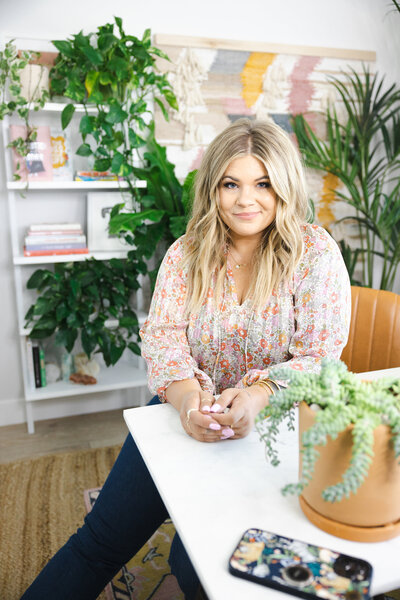
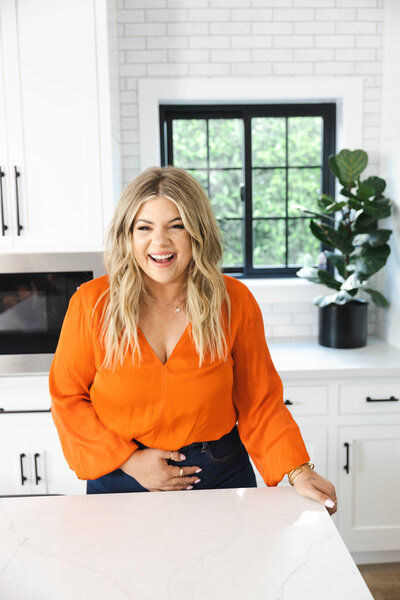
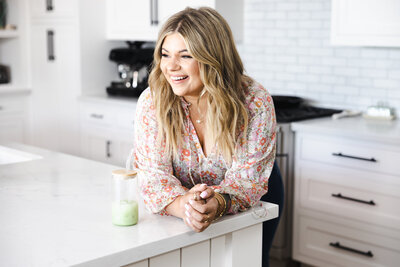
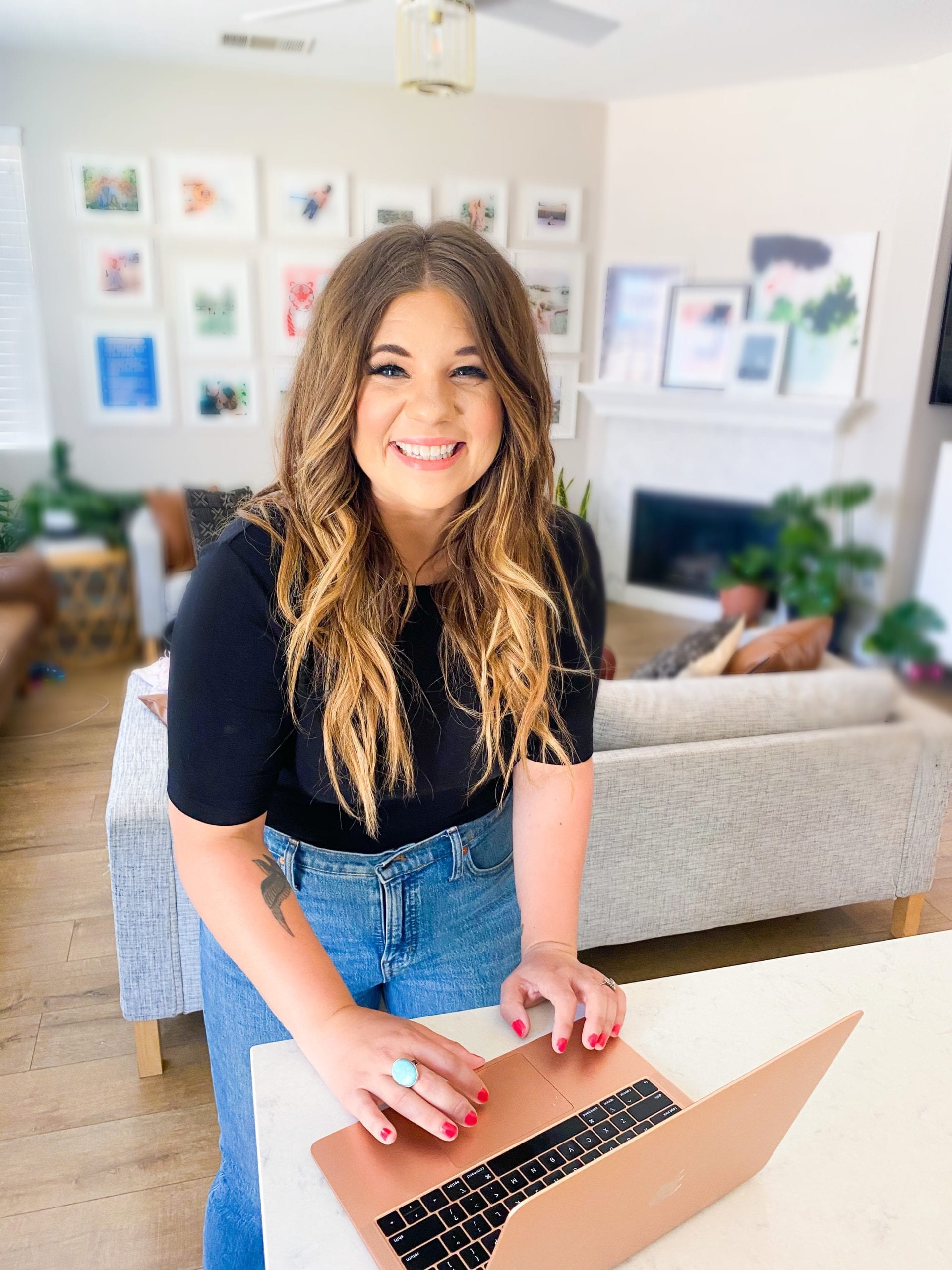

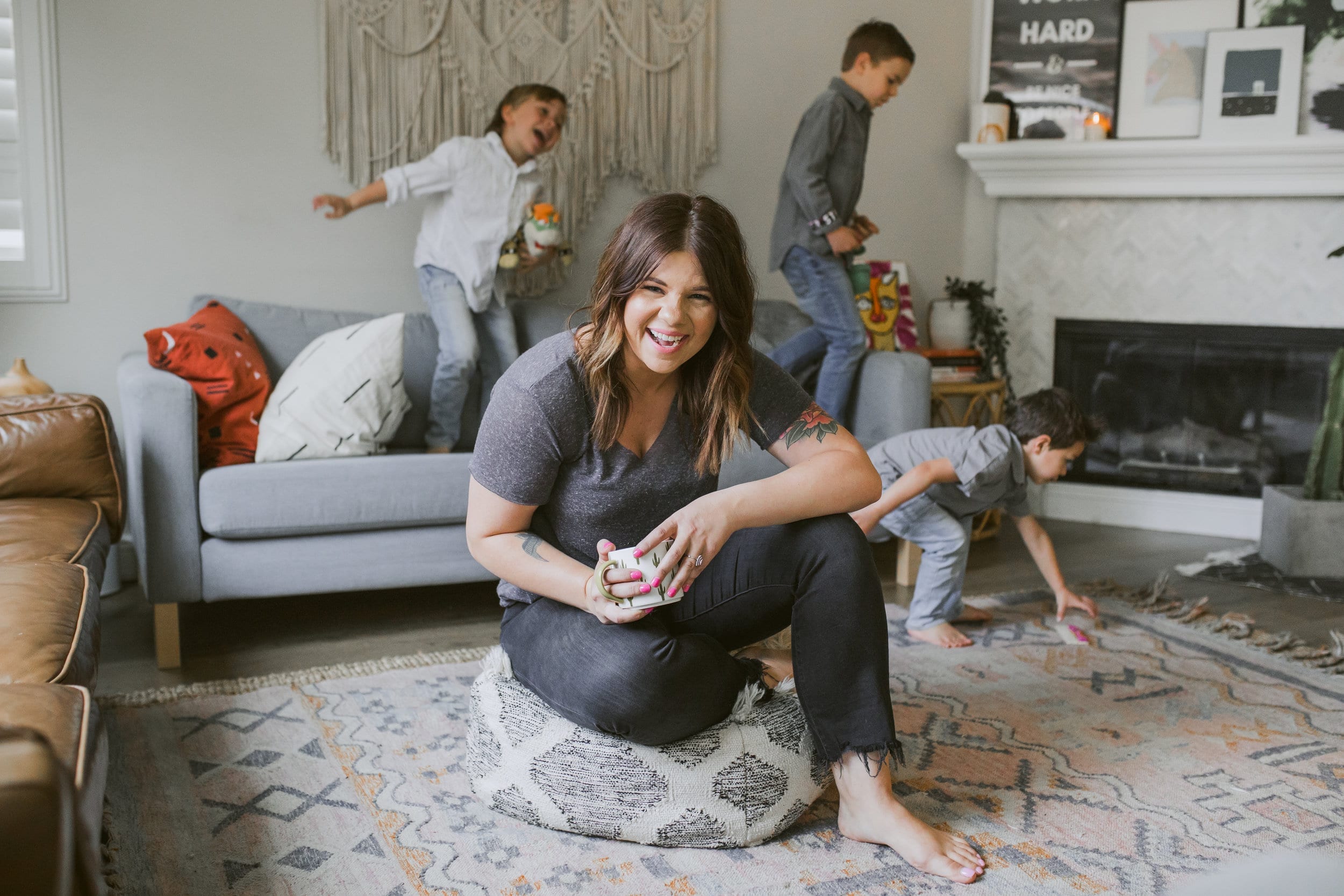

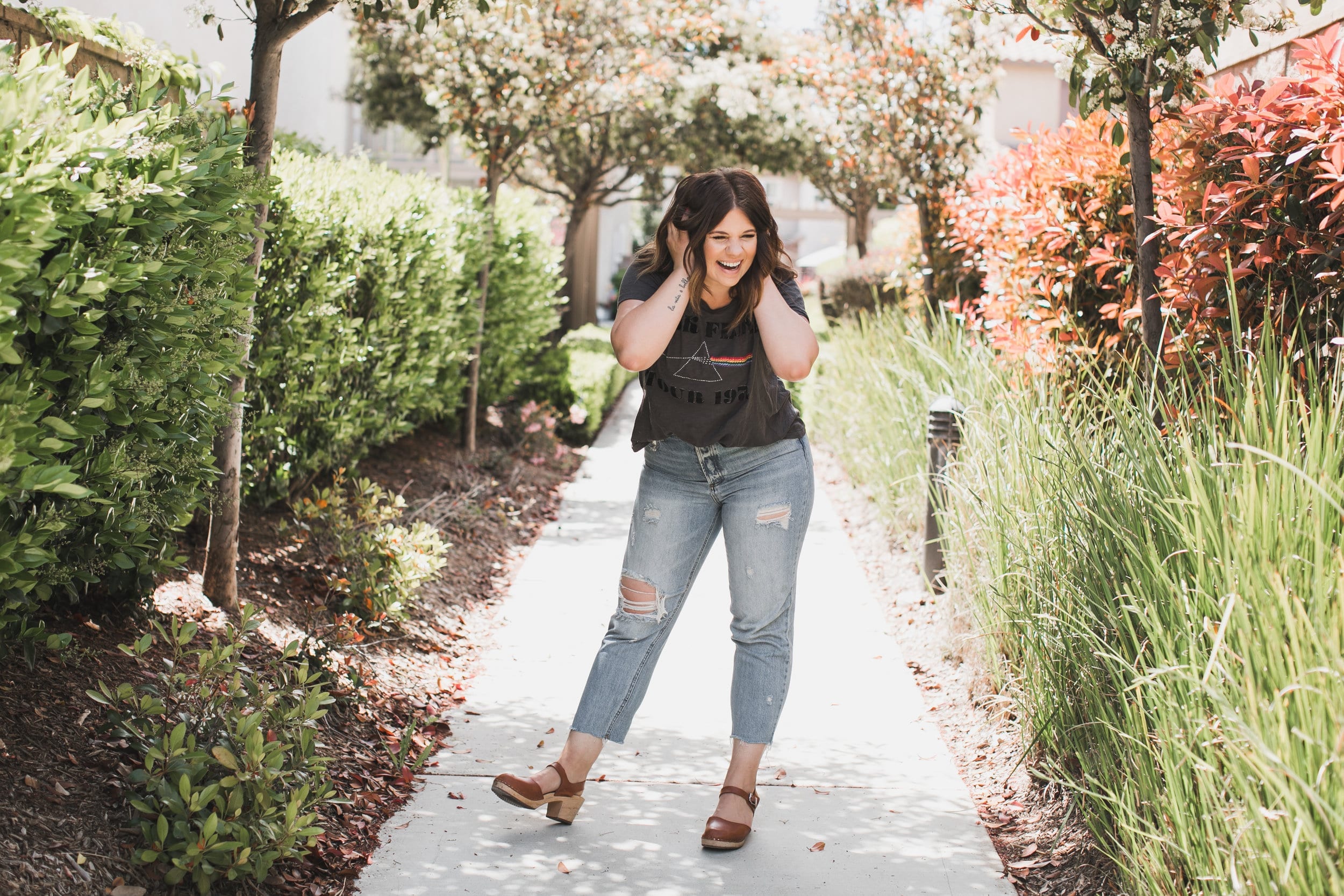

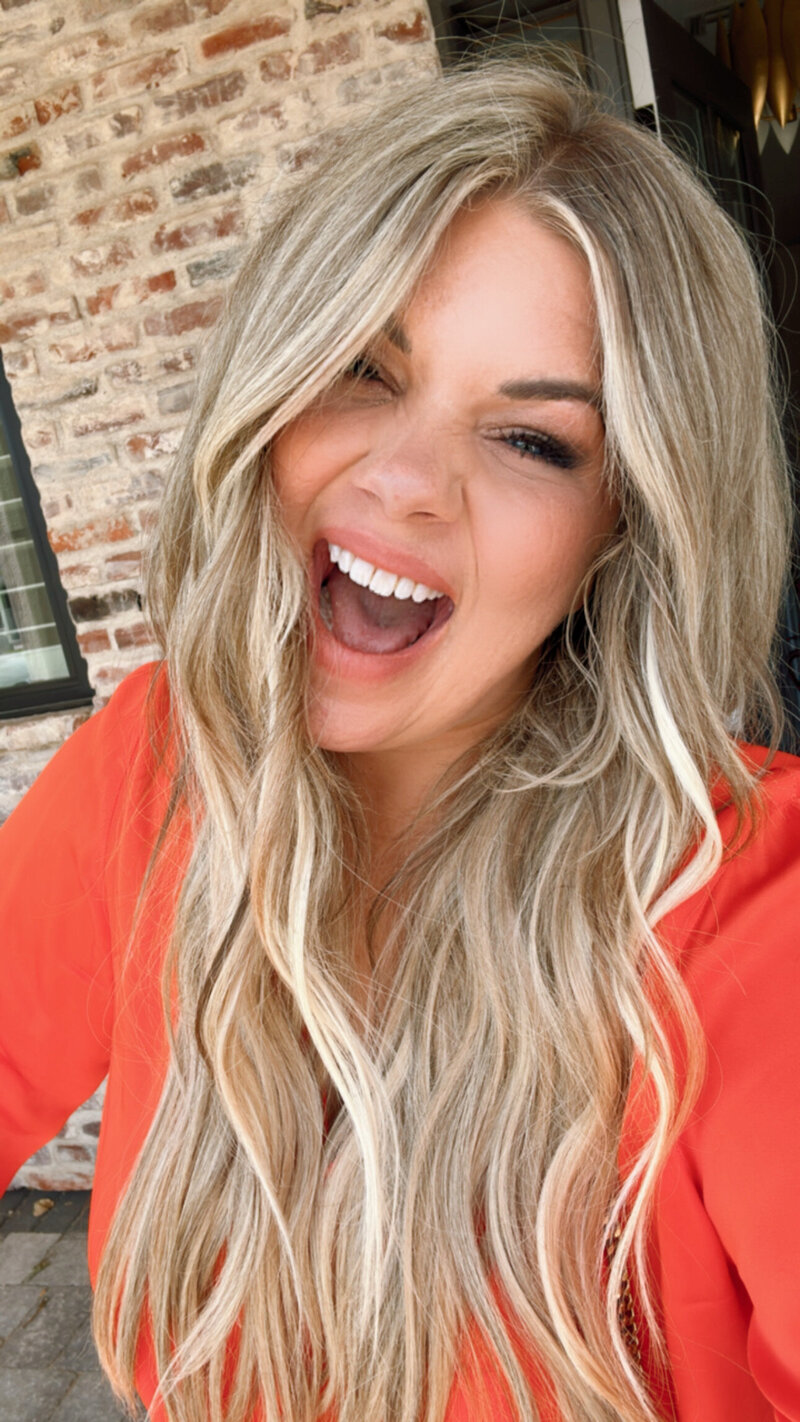



+ show Comments
- Hide Comments
add a comment